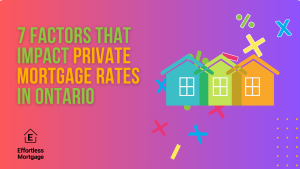
Are you going to be able to afford your mortgage next year?
Let’s discuss how the interest changes are impacting the housing market and your mortgage.
Whether you are a homeowner who’s wondering about your mortgage, or you are looking to get into the housing market, the first thing we advise is “STOP” reading the news. There is so much misinformation out there.
The news headlines are written to catch eyeballs. In a time like this, the media does very little other than create fear and panic.
“Toronto Housing Crash Up To 36% In Some GTA Suburbs Since February 2022”
Let’s take that article as an example. It says certain neighbourhoods in the GTA such as King City have seen property prices dropping as much as 36% vs March peak. OMG. That sounds scary, right?! 36% in just a matter of three to four months!
But if you look deeper, the data it was referring to was biased and limited.

First of all, King City is a small community with a large concentration of luxury homes. After pulling up the sold records in King City in the last 30 days, we found three homes sold — a $3M home, $1.2M townhouse and a $700K condo. Great — that’s all dwelling types! But it’s one each.
How can you average 3 houses with each a different dwelling type? And, with luxury homes, each property is just so different that something with a 20 ft marble countertop and a very manicured garden could sell for $100K more. How do you average that with a condo?
HENCE, these types of headlines and data don’t offer what’s really going on.
So, let’s get down to real data.
Where is Canada's Housing Market Headed?
Interest Rate Changes
Bank of Canada Bank Rate has increased by 1.25% this year. It went from 0.25% in March 2022 to 1.5% in June 2022. We have seen similar changes around the end of 2017 – the Bank of Canada Overnight Rate went from 0.5% to 1.75% over the span of 12 months.

The higher overall interest rate led the increase of mortgage rates in the past three months. However, the impact on different terms varies a lot.
See below for a list of mortgage rate increases by term for Insured Mortgages between March 2022 and June 2022:
-
5 Year Variable Rate – increased from 1.40% (some lender was offering 0.99%) to 2.65% – up by 1.25%
-
5 Year Fixed Rate – increased from 2.80% to 4.39% – up by 1.6%
B Lender Mortgage Rates went up by on average 2%.
Private Mortgage Rates also went up by 1% for both 1st and 2nd mortgages.
Surprisingly, Private Mortgage Lenders did not increase their interest rate by much, when compared to Bank and B Lenders. This is primarily driven by a higher demand for private mortgage investment.
Will Interest Rate Continue to Go Up?
The short answer is Yes. Forecasts predict six Bank of Canada interest rate hikes in 2022. Up until June 2022, we have seen three rate hikes, so there are three more to go.
The magnitude of the interest rate increase depends on the inflation, GDP growth in that quarter, and many other factors, but it will typically be either 0.25% or 0.5% per rate hike. With that, we will likely see interest rate go up by 0.75% to 1.5% by the end of 2022. This means the Overnight
As per the Bank of Canada official press release in June, they will continue to increase interest rate until it’s high enough to curb inflation. The consensus on the street is that the Overnight Rate will reach 3% to 3.5% by the end of 2022. Many expect it to gradually come back down by late 2023 or early 2024.
How Will This Impact Home Prices?
Many people want to draw a direct relationship between Home Prices and Interest Rates.
It is fair to say, with all else being equal, when Interest Rates are higher, people’s mortgage payments are higher, homes become less affordable, and home prices will fall.
But things are rarely that simple.
It also depends on the wage growth, GDP number, inflation, and the overall supply-demand situation in the housing market.
No one is disputing that the housing market has been correcting itself. As per the CREA Home Price Index Data, the average home prices have dropped by about 5% as of June from the March highs, while certain neighborhood like Kitchener-Waterloo has dropped by over 10%.
But keep in mind – it’s a declined after seeing on average 20-30% annual appreciation in the past couple of years.
The question is, where will the prices go from here?
Will they continue to fall or will they behave like what we have seen in 2017?
Back in 2017, prices fell for about two quarters. Then it remained flat for a few years before it took off during the pandemic.

Let’s take a look at the…
Top 3 Reasons Why Home Prices Will Continue to Fall vs. the Top 3 Reasons to Believe the Correction Might be Short-lived.
Reasons for Home Prices to Fall
- Higher mortgage payment and inflation makes owning a home more expensive. 1% increase in mortgage rate typically increases your monthly payment by about 10%. We will go through an example in the following chapter.
- Price has went up by 40% to 70% since the start of the pandemic (early 2020), this is not sustainable. Like stock market, the housing market is cyclical. Things cannot go up forever, and therefore, we will likely see a much welcomed correction from the pandemic highs.
- Investors and speculators will hold off from buying more real estate due to higher cost. Home prices have already increased so much. Coupled with higher cost of the mortgage, investing in rental properties start to look less attractive.
Reasons for Home Prices to Remain Strong
- Rent is expensive and will continue to increase. Rental rates are increasing at 1-2% per month over the past 12 months – it’s up 21% YoY as of May 2022. It will likely continue to rise due to inflation and lack of rental units across major cities. In other words, the alternative of owing a home, i.e. renting, is not a cheap one either. 10% increase in monthly mortgage payment seems high, but doesn’t look that bad vs. 21% increase in rent.
- Lack of inventory/housing supplies. Due to years of under-building, and the increasingly higher cost to build housing units, the supply of the Canadian housing market remains extremely tight.
- Real Estate is historically a better investment than Stocks during high inflation time period. The stock market has been bleeding red since April. Let’s not even get into Crypto. Real Estate remains a relatively safe and stable asset class – and a lot of real estate investors are looking for good deals to add to their portfolio during the correction.
Your Mortgage Payment
How Will This Impact Your Mortgage Payment?
If you have just locked into a fixed rate, whether it’s 3,4, or 5 year, your mortgage payment is likely not going to be impacted.
And roughly three quarters (72%) of Canadian homeowners have a fixed rate mortgage.

If you are either in a variable rate mortgage, or looking to renewal or refinance, then your mortgage payment will go up. But by how much? Let’s take a look at an example.
Let’s say you bought a house for $620k in 2021 and after the down payment you borrower $500,000 mortgage. If you got a 5-year fixed rate at 2.99%, assume a 25-year amortization, your monthly payment would have been $2,368 a month.
With all else being equal, if you got the same mortgage in 2022, and your mortgage rate is now at 4.99%, your monthly payment is now at $2,920 a month, which is $552 higher than what it would have been in 2021.
At a high level, your monthly mortgage payment on each $100,000 mortgage balance will increase by about $55 a month for each 1% increase in mortgage rate.
Many people wonder whether such an increase will lead to a “sell out” in the market. Our view is the same of most of the Economists in Canada, there is more likely a correction in the housing market, not a melt down.
A 2% increase in the mortgage rate has already been “priced in” through the stress test rule introduced in 2018. Plus the majority of the home owners are in a fixed rate longer than 2 years, which allows them to ride out the rate interest.
Rates will likely slowly adjust downwards in late 2023 early 2024.
The image below shows how higher interest rate can impact your mortgage payment.

To Sum It Up
Bank of Canada Interest rate has increased by 1.25% since March 2022, and will likely see another 1.25% to 1.5% increase by the end of the year.
Higher mortgage rate combined with market cyclicality has led to some long-waited correction in Home Prices. However, average home prices remain elevated.
While we can all agree there has been some softening in the housing market, it is hard to say which direction the prices will go given higher rent, inflation, and the uncertainties in the stock market.
Three quarter of Canadians are locked into a fixed rate mortgage, and therefore will likely be able to ride out the wave of interest hikes.
For those with variable rate mortgages, the monthly payment would have increased by $110 a month approximately for every $100,000 of mortgage.
For those who are renewing or thinking about refinancing, it’s important to talk to an experienced Mortgage Broker to ensure you get the best products that can help you save money in the long run.








